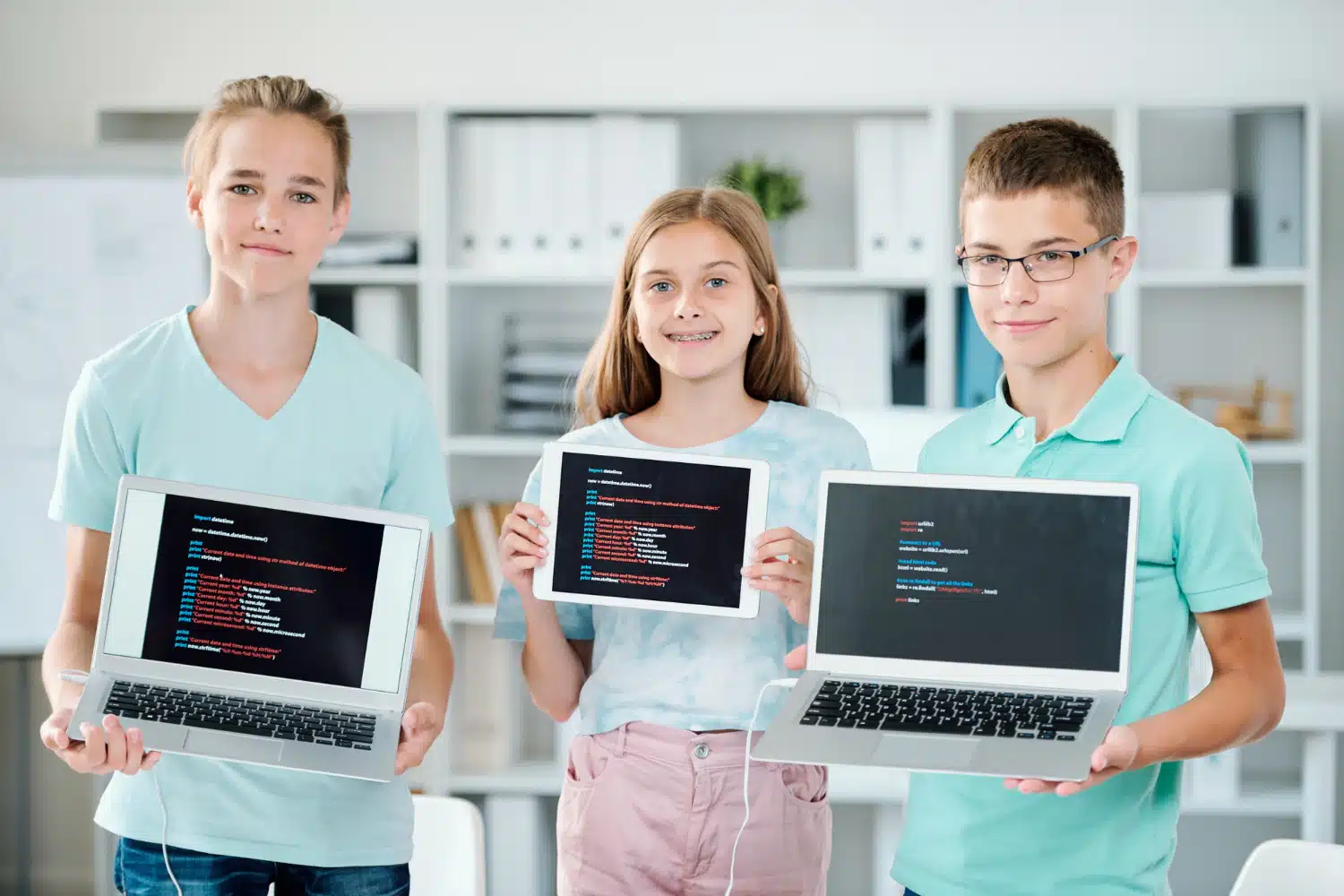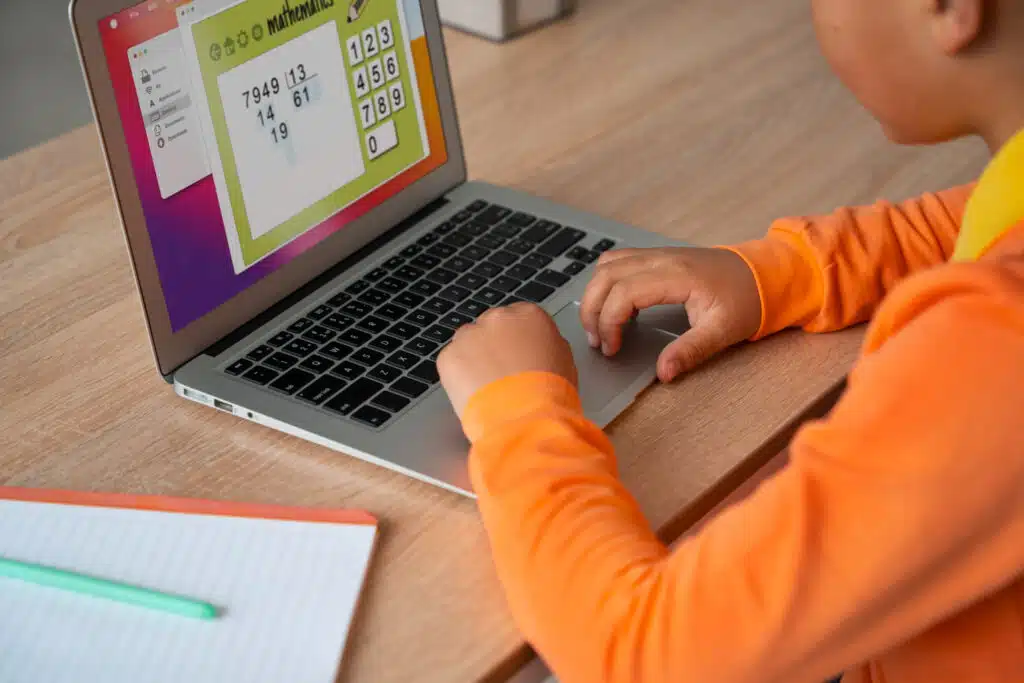
Coding isn’t just for future developers, it’s a tool for thinking, creating, and solving everyday problems. From decision-making to digital fluency, the skills kids gain through coding ripple far beyond the screen.
At Real Programming 4 Kids (RP4K), our mission is to equip kids with real-world skills through the fun and challenge of coding. But beyond the screen and syntax, learning to code offers something much deeper: the ability to think critically, problem-solve creatively, and navigate a digital world with confidence. Coding is more than a tech skill, it’s a mindset, a language, and a path to future opportunity.
Whether a child becomes a developer or simply gains a better understanding of how the world works, the benefits of learning to code for kids go far beyond writing programs. Let’s explore the real-life applications of coding for kids and how RP4K helps unlock their potential, one line of code at a time.
Coding encourages children to think like engineers, analytically, logically, and iteratively. Every time a child writes code, they are learning to break a problem down, test solutions, and refine their approach.
At RP4K, we teach our students that there’s rarely one "right" way to solve a challenge. Much like an engineer, our students develop hypotheses, build prototypes (code), and debug (test and refine). They learn to think beyond the obvious, to experiment and adapt, essential skills not only in technology but in life.
This foundation fosters coding and critical thinking, showing kids how to approach real-world problems methodically and with resilience.
In our classes, mistakes aren’t setbacks, they’re signals. Every bug is an opportunity to learn something new. This mindset is transformative.
Kids who struggle with self-doubt in traditional school subjects often find their confidence growing through coding. Why? Because debugging shows them that failure is not the end, but part of the process. That builds grit. That builds confidence.
Over time, students start to see their progress not just in functioning programs but in how they handle challenges. That shift can lead to better performance in the classroom, because when children feel capable, they engage more deeply in all areas of learning.
We see it all the time at RP4K: Students who once hesitated to try now lean into problems with curiosity and courage.
From cracking enemy codes in World War II to landing astronauts on the moon, coding has shaped some of the most important moments in human history.
When kids learn programming, they join a tradition of thinkers, tinkerers, and innovators who used code to change the world. At RP4K, we often explore these stories in class. Students learn how Ada Lovelace imagined the first algorithm, a moment highlighted in the Library of Congress’s “Women in Science and Technology” collection. They discover how for-loops and conditionals were used in code-breaking machines like the Bombe during WWII, a story celebrated by historical and engineering societies.
Students also gain perspective from broader timelines, like the IEEE Computer Society’s Timeline of Programming Languages, which traces innovations from the 1840s to today. These breakthroughs show how imagination and logic have always worked hand-in-hand to push society forward.
And thanks to national efforts like Computer Science for All, kids today have more opportunities than ever to follow in those footsteps. What they build in class could inspire the next chapter in this story.

Coding is a language, a powerful one. Like Spanish or French, programming languages have structure, syntax, and rules. And just like spoken languages, they help kids express ideas and solve problems.
At RP4K, we teach real coding languages from the start:
While many programs stick to drag-and-drop tools like Scratch, we go further. Our youngest students begin with Python, gaining hands-on experience with a real language that powers websites, AI, and apps.
Through this approach, kids experience improved digital literacy without even realizing it, and it helps children interact with the digital world safely. They’re translating their creativity into executable actions, deepening their understanding of how digital systems actually work.
Today’s kids are digital natives, but being fluent in technology isn’t the same as understanding it. That’s why we empower our students to go beyond the screen.
From apps and wearables to traffic lights and smart TVs, software is everywhere. Learning to code means kids can look under the hood and see how these systems function. They’re no longer just consumers of tech, they become creators, tinkerers, and responsible users. When children understand the logic behind these tools, they feel more in control and less alienated from the tech they use daily.
This awareness helps kids navigate the web more safely and confidently. After all, when you understand how something works, it feels less mysterious and more manageable.
That’s the power of coding in everyday life.
We’ll let you in on a secret: At RP4K, we teach a lot of math. But kids don’t always realize it, because they’re too busy having fun.
Our founder is a mathematician, and from day one, math has been baked into our curriculum. As students build games and apps, they explore concepts like:
They may not know it, but they’re building stronger math skills with every session. Over time, they start to understand how coding helps with math, not just in theory, but in practice.
Our students become more confident in math class because they’ve applied those concepts to real-world coding challenges. This is STEM learning in action.
The job market is changing fast, and coding is one of the most in-demand skills across countless industries. But even if your child never becomes a programmer, the stem skills for kids they develop through coding are incredibly valuable.
From logical reasoning and math fluency to teamwork and communication, the skills learned at RP4K apply in fields like:
Finally, knowing how to code opens the door to countless jobs, including in fields adjacent to video game design or programming. Many exciting and good-paying IT career paths involve general computer skills kids obtain while learning to code.
The video game industry is now worth more than the film and music industries combined! That’s one reason parents want their kids to know how to code games, not just play them. However, there are even more jobs available than that.
If kids learned nothing from coding classes and only enjoyed a fun extracurricular, that would be reason enough to sign them up. But fun aside, there are many direct and indirect benefits of learning to code for kids, so contact RP4K today to inquire about which class is right for your child.
So where exactly do these coding skills show up outside of class?
Here are just a few real-world uses of programming for students:
These examples show how the real-life applications of coding for kids go well beyond computer screens. They help kids approach life with structure, curiosity, and capability.
And when that spark of understanding hits, when they connect the dots between what they built and the world around them, it sticks.
Coding doesn’t just build apps. It builds better thinkers.
In every RP4K class, students encounter foundational programming concepts like if-statements, for-loops, and conditionals. They learn how code makes decisions based on logic, and soon recognize that they do the same thing every day.
"If I do my homework, then I can play video games." That’s a conditional.
"Loop through this list of chores until they’re done." That’s iteration.
By teaching high-level programming languages in a way that connects back to their lived experiences, we help kids internalize not just how code works, but how structured thinking can help with everything from planning a project to making responsible choices.
These transferable skills are part of what makes coding such a powerful educational tool. When kids grasp the logic behind their programs, they also start to understand the logic behind their lives.
We’ve been teaching kids to code for over 24 years, and we’re just getting started.
What sets us apart?
We don’t just teach kids how to code, we help them understand why it matters.
Whether your child is just starting out or ready to take their skills to the next level, our programs are designed to meet them where they are. If you’re looking to learn coding online in a way that builds confidence and competence, RP4K is here to help.
If your child could benefit from more confidence, stronger critical thinking skills, or just a fun, challenging extracurricular that stretches their brain, we’d love to meet them.
The benefits of learning to code for kids aren’t theoretical, we see them play out in every class. And while coding might be the hook, it’s the growth mindset, resilience, and real-world readiness that keep students (and parents) coming back.
Join us at RP4K and give your child the tools to succeed today, tomorrow, and for years to come.
Explore our programs and find the right fit today.